- Home
- Patricia Briggs
Masques s-1
Masques s-1 Read online
Masques
( Sianim - 1 )
Patricia Briggs
After an upbringing of proper behavior and oppressive expectations, Aralorn fled her noble birthright for a life of adventure as a mercenary spy. Her latest mission involves spying on the increasingly powerful sorcerer Geoffrey ae'Magi. But in a war against an enemy armed with the powers of illusion, how do you know who the true enemy is—or where he will strike next?
Masques
(The first book in the Sianim series)
A novel by Patricia Briggs
With love to my parents:
Harvey C. Rowland
1917-1989
Betty J. Rowland
1920 -1992
INTRODUCTION
One day, in the middle of my senior year of college, I decided to write a book. I’d written a few things before. Nothing so complex as an actual short story (aside from a few five-hundred-word shorts for various high-school assignments and one memorably bad story I’d written in German in lieu of a report), but scenes and scraps of dialogue. I’d never met an author, never gone to an SF convention, when I set out to write this book. And for the next few years I wrote, and rewrote, the first ten pages of my novel. Those ten pages, I might add, are the first thing I cut for this edition. Sometimes I wake up in the middle of the night and find myself muttering those lines: The great hall of the castle was his favorite room . . .
With our newly minted degrees, my husband and I set out for the wilds of Chicago, where Mike had taken a job as an aquarist with the John G. Shedd Aquarium (we do seem to have had a lot of interesting if not lucrative careers, my husband and I) and I began working at an insurance office. The Greater Chicago area had seven and a half million people. My home state of Montana (in the 1990s) had eight hundred thousand people—in the whole state. Suddenly my manuscript represented more than a challenge—it was an escape. Don’t get me wrong, I loved Chicago—I just didn’t love living with seven and a half freaking million people.
We stayed a full year before culture shock sent us racing homeward, and about that time, somewhat to my surprise, I had finished the book.
I knew that I knew nothing about writing a book when I started it. So I took those things I did know and stuck with them. The plot, my patient husband pointed out, had been done before—but I was okay with that. The important thing to me was that I’d actually finished the book. It shocked and amazed me when the book actually sold.
Masques, when it came out, was what my husband likes to call an extremely limited edition. That’s husband speak for “It sold very poorly.” Fortunately, before my publisher figured out just how poorly it had done, they’d bought Steal the Dragon as well. My second book, blessed by a terrific Royo cover and a writer who had figured out a little more about writing, did a lot better than the first. Masques went out of print the month Steal the Dragon came out back in 1995, and hasn’t been in print since.
Years passed by, my career started to pick up, and Masques started to command higher prices on the secondary market. If I had a box of twenty-four copies left, I could sell them on eBay for more than I sold the publication rights for the original novel.
With that in mind, I took out the unpublished sequel, Wolfsbane, blew off the dust, and did an extensive polishing run. I sent the result to my editor and asked about reprinting Masques and publishing Wolfsbane. She agreed and asked me if I wanted to revise Masques before they released it. Absolutely, I said. Please. And that was about the time I got a call asking me if I’d like to try my hand at an urban fantasy first. With the subsequent success of the Mercy Thompson and Alpha and Omega novels, Masques and Wolfsbane got put on the back burner for a few years.
Finally, I had a bit of breathing room and sat down for the first time in a decade or so to start reading Masques. I had intended to do a brief polishing run. I read the first chapter (squirming uncomfortably all the way through) and turned to my husband. “By golly,” I said (or words to that effect). “Why didn’t someone tell me I needed to use a few descriptions?”
When I wrote Masques, I was in my twenties and hadn’t even finished a short story worthy of the name. I knew nothing about writing. The only tool I had in my craftbox was that I loved the fantasy genre and had read a lot of books. Twenty years later, I’ve written more than fifteen books, discussed/argued writing with a number of enormously skilled craftspeople—and learned a lot in the process. But that same experience also means I could not write Masques now.
Thus, fixing the book and still allowing it to be the same story, my first story, became quite a problem.
In the end, Masques and I have come to a compromise. Though I have added a bit to the beginning, I have not taken away any of the original pieces of the story (much as it sometimes pained me). I just fit those pieces together a little better. I left in most of the clichés and the oddities that, if I were editing an unpublished work, I would have removed. Thus, I hope that those few of you who read the original and remember it fondly will feel as though this is an expanded version of the same story. And that those of you who are only familiar with my later, more polished work won’t be disappointed.
PROLOGUE
The wolf stumbled from the cave, knowing that someone was searching for him and he couldn’t protect himself this time. Feverish and ill, his head throbbing so hard that it hurt to move, he couldn’t pull his thoughts together.
After all this time, after all of his preparations, he was going to be brought down by an illness.
The searcher’s tendrils spread out again, brushing across him without recognition or pause. The Northlands were rife with wild magic—which is why other magic couldn’t work correctly here. The searcher looked for a wizard and would never notice the wolf who concealed the man in its shape unless the fever betrayed him.
He should lie low, it was the best defense . . . but he was so afraid, and his illness clogged his thoughts.
Death didn’t frighten him; he sometimes thought he had come here seeking it. He was more afraid he wouldn’t die, afraid of what he would become. Perhaps the one who looked for him was just idly hunting—but when he felt a third sweep, he knew it was unlikely. He must have given himself away somehow. He’d always known that he would be found one day. He’d just never thought it would be when he was so weak.
He fought to blend better with the form he’d taken, to lose himself in the wolf. He succeeded.
The fourth sizzle of magic, the searcher’s magic, was too much for the wolf. The wolf was a simpler creature than the mage who hid within him. If he was frightened, he attacked or ran. There was no one here to attack, so he ran.
It wasn’t until the wolf was tired that he could gather his humanity—that was a laugh, his humanity—well then, he gathered himself together and stopped running. His ribs ached with the force of his breath and the tough pads of his feet were cut by stones and an occasional crystal of ice from a land where the sun would never completely melt winter’s gift. He was shivering though he felt hot, feverish. He was sick.
He couldn’t keep running—and it wasn’t only the wolf who craved escape—because running wasn’t escape, not from what he fled.
He closed his eyes, but that didn’t keep his head from throbbing in time with his pounding pulse. If he wasn’t going to die out here, he would have to find shelter. Someplace warm, where he could wait and recover. He was lucky he’d come south, and it was high summer. If it had been winter, his only chance would have been to return to the caves he’d run from.
A pile of leaves under a thicket of aspen caught his attention. If they were deep enough to be dry underneath, they would do for shelter. He headed downhill and started for the trees.
There was no warning. The ground simply gave out from under him so fast he was lyi
ng ten feet down on a pile of rotted stakes before he realized what had happened.
It was an old pit trap. He started to get up and realized that he hadn’t been as lucky as he thought. The stakes had snapped when he hit them, but so had his rear leg.
Perhaps if he hadn’t already been so sick, so tired, he could have done something. He’d long ago learned how to set pain aside while he used his magic. But, though he tried, he couldn’t distance himself from it this time, not while his body shivered with fever. Without magic, with a broken leg, he was trapped. The rotting stakes meant no one was watching the pit—no one to free him or kill him quickly. So he would die slowly.
That was all right because he didn’t want to be free so much as he didn’t want to be caught.
This was a trap, but it wasn’t His trap.
Perhaps, the wolf thought, as his good legs collapsed again, perhaps it would be good not to run anymore. The ground was cold and wet underneath him, and the flush of heat from fever and the frantic journey drained into the chill of his surroundings. He shivered with cold and pain and waited patiently . . . even happily, for death to come and take him.
* * *
“If you go to the Northlands in the summer you might avoid snowstorms, but you get mud.” Aralorn, Staff Page, Runner, and Scout for the Sixth Field Hundred, kicked a rock, which arced into the air and landed with an unsatisfactory splut just ahead of her on the mucky trail.
It wasn’t a real trail. If it hadn’t led from the village directly to the well-used camping spot her unit was currently stopped at, she’d have called it a deer trail and suspected that human feet had never trod it.
“I could have told them that,” she said. “But no one asked me.”
She took another step, and her left boot sank six inches down into a patch that looked just like the bit before it that had held her weight just fine. She pulled her foot out and shook it, trying unsuccessfully to get the thick mud off. When she started walking again, her mud-coated boot weighed twice what her right boot did.
“I suppose,” she said in resigned tones as she squelched along, “training isn’t supposed to be fun, and sometimes we have to fight in the mud. But there’s mud in warmer places. We could go hunting Uriah in the old Great Swamp. That would be good training and useful, but no one would pay us. Mercenaries can’t possibly be useful without someone paying us. So we’re stuck—literally in the case of our supply wagons—practicing maneuvers in the cold mud.”
Her sympathetic audience sighed and butted her with his head. She rubbed her horse’s gray cheekbone under the leather straps of his bridle. “I know, Sheen. We could get there in an hour if we hurry—but I see no sense in encouraging stupid behavior.”
One of the supply wagons was so bogged down in mud that it had broken an axle when they tried to pull it out. Aralorn had been sent out to the nearest village to have a smith repair the damage because the smith they’d brought with them had broken his arm trying to help get the wagon out.
That there had been a nearby village was something of a surprise out in the Northlands—though they weren’t very deep into them. That village had probably been why the mercenary troops had been sent to practice where they were instead of twenty miles east or west.
The mended axle was tied lengthwise onto the left side of Sheen’s saddle, with a weighted bag tied to the opposite stirrup to balance the load. It made riding awkward, which was why Aralorn was walking. Part of the reason, anyway.
“If we get to camp too early, our glorious and inexperienced captain will be ordering the wagon repaired right away. He’ll send us out from a fairly good campsite to march for another few miles until the sun sets—and we’ll be looking for another reasonable place to camp all night.” The captain was a good sort, and would be a fine leader—eventually. But right now he was pretty set on proving his mettle and so lost to common sense. He needed to be managed properly by someone with a little more experience.
“If I don’t arrive with the axle until it’s dark, then he’ll have to wait to move out until dawn,” she told Sheen. “With daylight, it won’t take long to fix the wagon, and we’ll all get a good night’s sleep. You and I can trot the last half mile or so, just enough to raise a light sweat and claim it was the smith who took so long.”
Her warhorse jerked his head up abruptly. He snorted, his nostrils fluttering as he sucked air and flattened his ears at whatever his nose was telling him.
Aralorn thumbed off the thong that kept her sword in its sheath and looked around carefully. It wasn’t just a person—he’d have alerted her to that with a twitch of his ear.
The scent of blood might have called her horse’s battle training to the fore, she thought, or maybe he sensed some sort of predator. This was the Northlands, after all; there were bear, wolves, and a few other things large enough to cause Sheen’s upset.
The gray stallion whinnied a shrill challenge that was likely to be heard for miles around. She could only hope that her captain didn’t hear it. Whatever Sheen sensed, it was in the aspen grove just uphill from where they stood. It was also, apparently, in no hurry to attack them since nothing answered Sheen’s call: no return challenge, not even a rustle.
She could go on past. Likely, if it hadn’t come out yet, it wasn’t going to. But what was the fun in that?
She dropped Sheen’s reins on the ground. He’d stand until she came back—at least until he got hungry. Aralorn drew her knife and crept into the thicket of aspen.
* * *
He heard her talking and smelled the horse without moving. He’d heard them come by earlier, too—or he thought so anyway. The horse put up a fuss this time because the wind that ruffled the leaves of the aspen would have brought him the wolf’s scent.
He waited for them to leave. Tonight, he thought hopefully. Tonight would be the third night he’d spent here, maybe it would be the last. But part of him knew better, knew just how long it took for a body to die of thirst or of hunger. He was too strong yet. It would be tomorrow, at the soonest.
He’d distracted himself with the hope of death, and only the sound of the woman’s feet told him that she’d approached. He opened his eyes to see a sturdily built woman, plain of face except for her large sea-green eyes, leaning over the edge of the pit. She wore the uniform of the mercenaries, and there were calluses and mud on her hands.
He didn’t want to see her eyes, didn’t want to feel interest in her at all. He only wanted her to leave him alone so he could die.
“Plague them all,” she said, her voice tight and angry. Then her voice softened to a croon. “How long have you been here, love?”
The wolf recognized the threat of the knife she held as she slid down the far side of the pit to stand, one foot on either side of his hips. He growled, rolling off his side in preparation to get up—because he’d forgotten he wanted to die. Just for a moment. He shook from exertion, sickness, and from the pain of moving his leg. He lay back down again and flattened his ears.
“Shh,” she crooned, inexplicably sheathing her knife in the face of his aggression. “Not so long as all that, apparently. Now what shall I do about you?”
Go away, he thought. He growled at her with as much threat as he could, feeling his lips peel back from his fangs and the hair rise along his spine.
The expression on her face was not the one that he’d expected. Certainly not one any sane person would turn on a threatening wolf she was standing over. She should fear him.
Instead . . . “Poor thing,” she said in that same crooning tone. “Let’s get you out of this, shall we?”
She dropped her gaze away from his and knelt to examine his hips, humming softly as she moved closer.
She didn’t stink of fear, was all he could think. Everyone feared him. Everyone. Even Him, even the one who searched. She smelled of horse, sweat, and something sweet. No fear.
He snarled, and she wrapped one hand over his muzzle. Sheer astonishment stopped his growls. Just how stupid was she?
&n
bsp; “Shh.” Her voice blended into the music she was making, and he realized that her humming was pulling magic out of the ground around and beneath them. “Let me look.”
He was as surprised at himself as he was at her when he let her do just that. He could have torn out her throat or broken her neck while she examined every inch of him. But he didn’t—and he wasn’t quite certain why not.
It wasn’t that killing her would bother him. He’d killed a lot of people. But that was before. He didn’t want to do that anymore. So perhaps that was part of it.
He knew she was trying to help him—but he didn’t want help. He wanted to die.
Her magic swept over and around him, cushioning him. The wolf whined softly and relaxed, leaving the mage in him fully in charge for the first time since the illness had hit. Maybe even longer ago than that.
Her magic didn’t work on the mage because he knew what it was—and, he admitted to himself, because it wasn’t coercive magic. He was mage enough to read her intent. She didn’t want the wolf to become a lapdog but only to relax.
But the woman’s helpful intent wasn’t why he didn’t kill her. Not the real reason. He hadn’t been interested in anything in longer than he could remember, but she made him curious. He’d only ever met a practitioner of green magic, wild magic, once before. They hid from the humans in the land—if there were any still left. But here was one wearing the clothes of a mercenary.
She could pick him up—which surprised him because she didn’t weigh much more than he did. But she couldn’t hoist him high enough to reach the edge of the trap, so she set him down again.
“Going to need some help,” she told him, and clambered to the top. She almost didn’t make it out of the pit herself; if it had been round, she wouldn’t have.
When she departed and took her magic with her, it left him bereaved—as if someone had covered him with a blanket, then removed it. And only when she left did he realize that her music had deadened his pain and soothed him, despite his being a mage on his guard against it.

 Wolfsbane
Wolfsbane When Demons Walk
When Demons Walk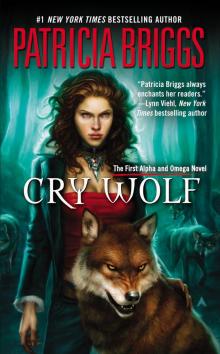 Cry Wolf
Cry Wolf On the Prowl
On the Prowl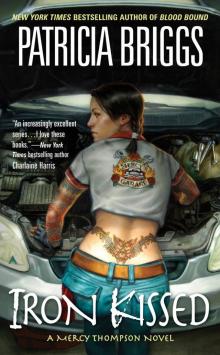 Iron Kissed
Iron Kissed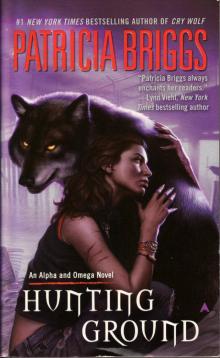 Hunting Ground
Hunting Ground Patricia Briggs Mercy Thompson: Hopcross Jilly
Patricia Briggs Mercy Thompson: Hopcross Jilly Burn Bright
Burn Bright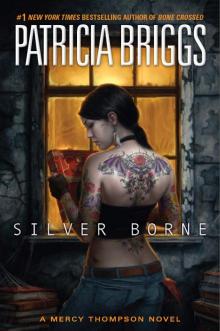 Silver Borne
Silver Borne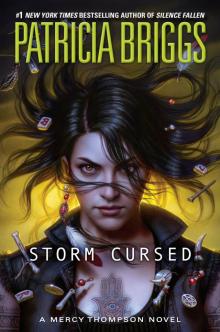 Storm Cursed
Storm Cursed Shifting Shadows
Shifting Shadows Frost Burned
Frost Burned River Marked
River Marked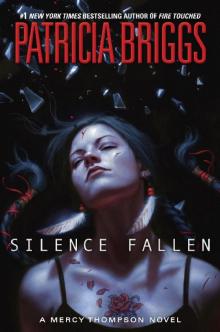 Silence Fallen
Silence Fallen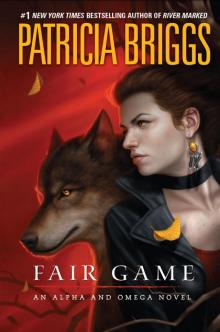 Fair Game
Fair Game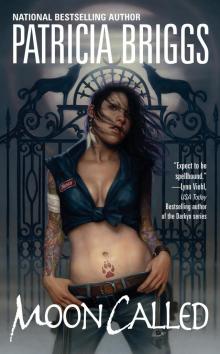 Moon Called
Moon Called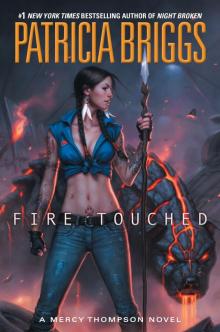 Fire Touched
Fire Touched Dead Heat
Dead Heat Blood Bound
Blood Bound Dragon Bones
Dragon Bones Night Broken
Night Broken The Hobs Bargain
The Hobs Bargain Ravens Shadow
Ravens Shadow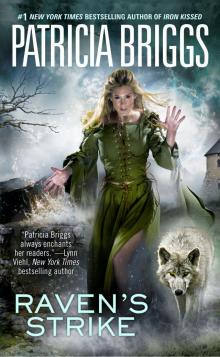 Ravens Strike
Ravens Strike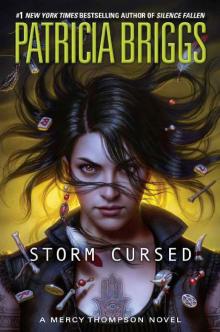 Storm Cursed (A Mercy Thompson Novel)
Storm Cursed (A Mercy Thompson Novel)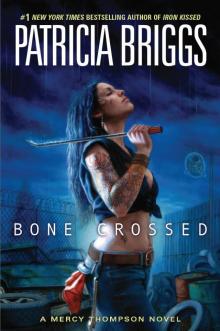 Bone Crossed
Bone Crossed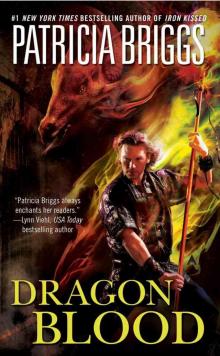 Dragon Blood
Dragon Blood Smoke Bitten: Mercy Thompson: Book 12
Smoke Bitten: Mercy Thompson: Book 12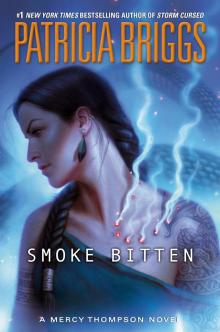 Smoke Bitten
Smoke Bitten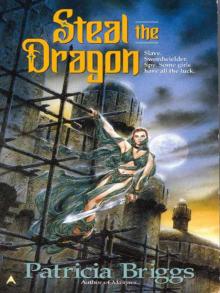 Steal the Dragon
Steal the Dragon 0.5 On The Prowl (alpha and omega)
0.5 On The Prowl (alpha and omega) Alpha and Omega
Alpha and Omega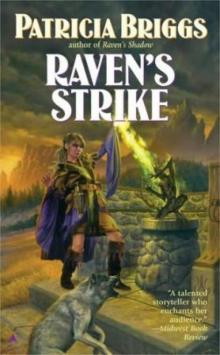 Raven's Strike rd-2
Raven's Strike rd-2![[Mercy 03] - Iron Kissed Read online](http://i1.bookreadfree.com/i/03/24/mercy_03_-_iron_kissed_preview.jpg) [Mercy 03] - Iron Kissed
[Mercy 03] - Iron Kissed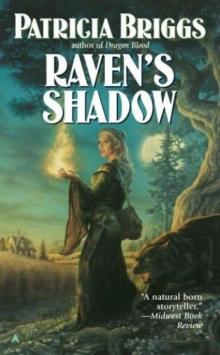 Raven's Shadow rd-1
Raven's Shadow rd-1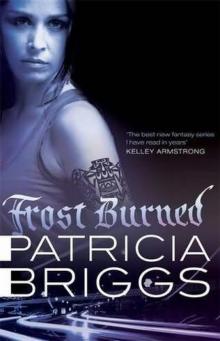 Frost Burned mt-7
Frost Burned mt-7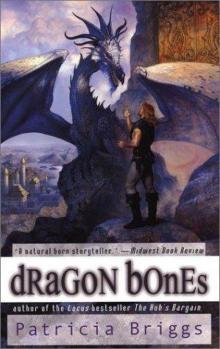 Dragon Bones h-1
Dragon Bones h-1 Shifting Shadows: Stories from the World of Mercy Thompson
Shifting Shadows: Stories from the World of Mercy Thompson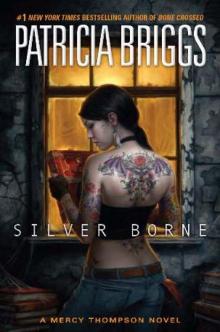 Silver Borne mt-5
Silver Borne mt-5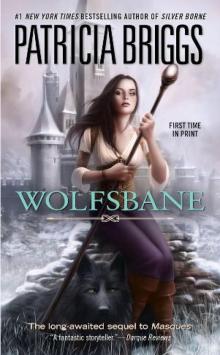 Wolfsbane s-2
Wolfsbane s-2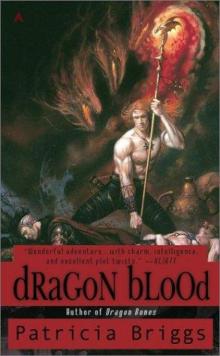 Dragon Blood h-2
Dragon Blood h-2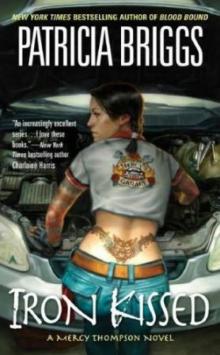 Iron Kissed mt-3
Iron Kissed mt-3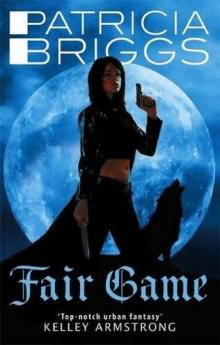 Fair Game aao-3
Fair Game aao-3 Masques s-1
Masques s-1![[Hurog 01] - Dragon Bones Read online](http://i1.bookreadfree.com/i1/04/03/hurog_01_-_dragon_bones_preview.jpg) [Hurog 01] - Dragon Bones
[Hurog 01] - Dragon Bones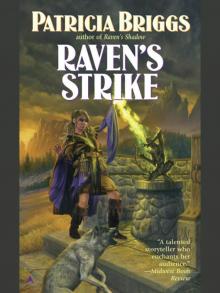 Raven s Strike
Raven s Strike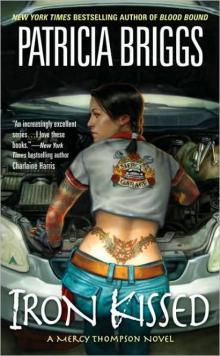 Mercedes Thompson 03: Iron Kissed
Mercedes Thompson 03: Iron Kissed Bone Crossed mt-4
Bone Crossed mt-4 Blood Bound mt-2
Blood Bound mt-2![[Mercy 01] - Moon Called Read online](http://i1.bookreadfree.com/i2/04/09/mercy_01_-_moon_called_preview.jpg) [Mercy 01] - Moon Called
[Mercy 01] - Moon Called River Marked mt-6
River Marked mt-6 The Mercy Thompson Collection
The Mercy Thompson Collection Moon Called mt-1
Moon Called mt-1 Mercy Thompson 8: Night Broken
Mercy Thompson 8: Night Broken